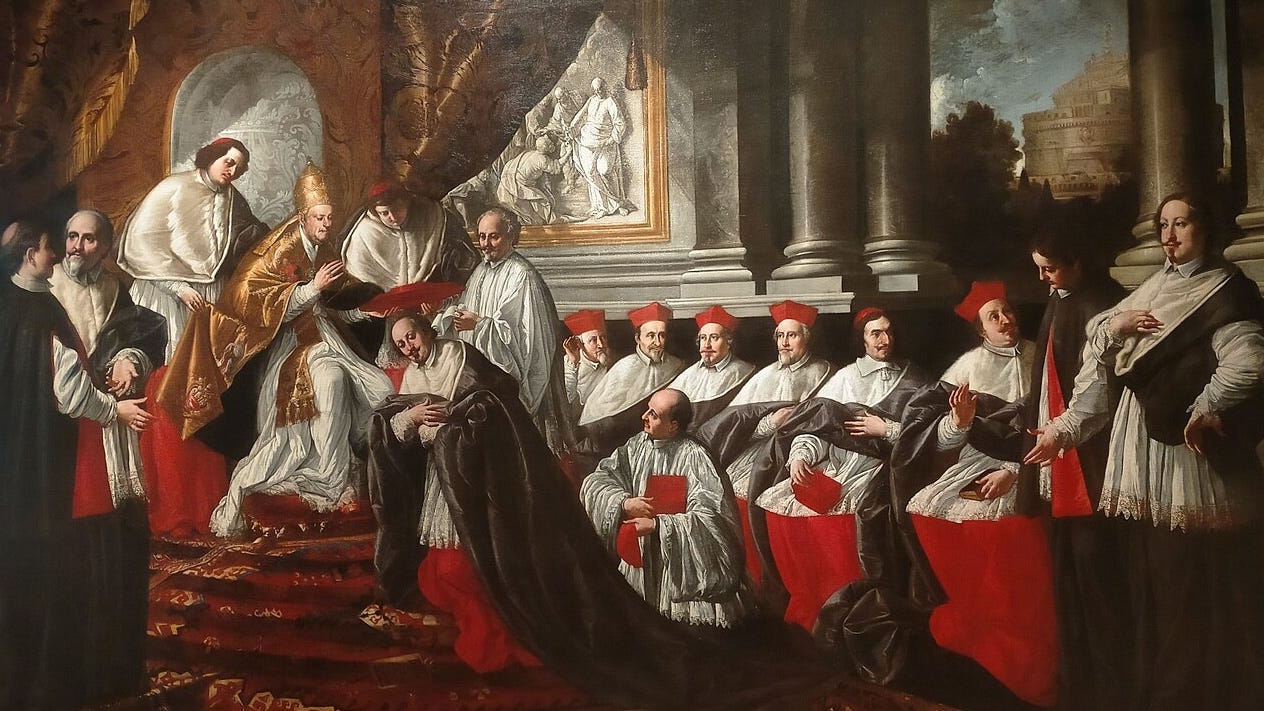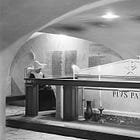Is the legitimacy of a universally and peacefully accepted pope a matter of faith? John of St Thomas
EXCLUSIVE translation of John of St Thomas on peaceful and universal acceptance of the pope. In this first part, the great Dominican theologian addresses the theological note of the question.

Editors’ Notes
We recently received the following suggestion:
“Sometimes I think you are your own worst enemy when it comes to arguing for your position. No offense. I think you are sincere and very well studied. But it seems you frequently concede ground out of caution when you don’t have to and it ends up weakening your arguments. […]
“Aren’t you all making this a lot harder than it is? UAP has nowhere been defined infallibly by the Church. Therefore it could be erroneous, no? And why aren’t you using the Cum Ex argument where it explicitly states the election is invalid even if accepted by all?”
The only response possible to such a suggestion is this:
We want the truth. We don’t want to use bad arguments, or to dismiss good ones. We don’t want to present things as more certain than they are.
We are not, and have never been, a part of a team that is seeking to win an interesting set of debates. The only “team” we are interested in is the Catholic Church.
We are not afraid of the arguments or acknowledging uncertainty – not least because, if contrary arguments truly prove us to be wrong, we still win: we will have been conquered by the truth.
We pray that God may preserve us in these dispositions, and strengthen them – such that we never find ourselves in the ignominious position of denying the known truth.
Universal and Peaceful Acceptance
To show that we really mean that, and in the interests of furthering the cause of the truth, we are making John of St Thomas’ detailed exploration of this doctrine available in English (possibly for the first time).
Many consider the so-called doctrine of universal and peaceful acceptance – and John of St Thomas’ treatment in particular – to be devastating to the idea that Francis is not the pope – because, they say, he is universally and peacefully accepted by the Church.
It could indeed be a powerful treatment against our central conclusions. But it is important that we get all the data onto the table – even that data which might seem to mitigate against us. We cannot form conclusions in ignorance of this data.
John of St Thomas (1589-1644) was a Portuguese Dominican, and is a highly respected theologian. For what it is worth, Antonio José Sánchez Sáez, Professor of Administrative Law at the University of Seville, wrote a paper in 2020 on the topic of “UPA,” in which he said:
“The fifteenth and sixteenth centuries passed without anything being said about [UPA]. So we can say that the true birth of the doctrine of the peaceful and universal accession of the pope as a proof of his validity was actually elaborated in the 17th century by John of St. Thomas (in his "Theological Course", 1640).”
In this first part of our translation, the Dominican theologian explores the status (or “note”) of the proposition “This particular man is the pope,” particularly in terms of whether it is known with moral certainty, mediate faith or immediate faith.
It is notable, incidentally, that John of St Thomas makes the following two comments. First, as grounds for doubting the validity of a papal election:
“An objection can also be raised against the person elected on the grounds of heresy; for example, if a manifest heretic is elected, he is not to be considered pope, as is evident from the same constitution of Julius II.
“Similarly, other exceptions of natural law may be admitted, such as if the person were not a man, or if he were insane, etc.”
Second, he refers to the Dominican theologian Bañez’s comments on grounds for doubting the legitimacy of universally and peacefully accepted claimant to the papacy:
“He finally concludes that it would be very rash and scandalous, after the Church has accepted someone as the supreme pontiff, to deny that he is the true supreme pontiff, unless it is shown that he is not baptised, or not a man; otherwise he would deserve to be punished, not only as strongly suspected of heresy, but as a heretic.
“Here, Master Bañez does not dare to condemn the opposite of that proposition simply as heresy, or against the faith, and seems to admit that it is not impossible to show that this man is not baptised.”
It does not seem too much of a stretch to consider, just as a failure in conditions of natural law may legitimise such grounds for doubt, so might a failure in conditions of divine law – including that the man may have fallen into manifest heresy. Both are rooted in the nature of things.
Two subsequent parts shall follow this one.
We would also like to point readers to the following, whilst retaining several reservations about its treatment of the issue (and in particular, its treatment of the so-called “Una Cum Mass”):
"The Thesis" – Chap. XIV, Answers to the Objections Based on the Universal Peaceful Acceptance
John of St Thomas
Tractatus de Auctoritate Sumi Pontificis,
Disputatio II, Articulus II, pp 228-264
Cursus Theologicus – Tomus Septimus in Secundam Secundae
Ludovicus Vives, Parisiis, 1886.
Disputation II:
On What the Church Can Do Regarding the Person of the Pope, Concerning His Election, Deposition, and the Certainty of the Person Elected
Article II: Whether, following a legitimate election having been made of a pope, it pertains directly to faith (per se primo – in itself in the first place) or indirectly to faith (per se secundo – in itself in the second place) that this particular person, for example, Innocent X, is the pope?
I. This question has become highly prominent in our times, and has been discussed with various arguments, for little is found about it among the ancients in the terms in which it is now discussed.
However, before we address the matters that make this issue difficult, we must explain two terms that are proposed or assumed in the title.
The first is facta legitima electione [the fact of a legitimate election]; the second is de fide per se primo, aut per se secundo [of faith per se first, or per se second].
“Legitimately elected”
With regard to the first point, we assume that it is possible for the election of a pope to be not legitimate, but rather doubtful or defective.
This can happen not only if it is conducted by illegitimate electors (that is, by persons who do not have the right to elect granted by the Church or the pope – for in that case, there is no doubt that the election is not an election, but a violent usurpation); but also if it is conducted by legitimate electors – that is, by cardinals, to whom this power is now entrusted in the Church.
However, some difficulty may arise as to whether an election conducted by the cardinals can be defective. In the first place, it cannot be defective on the part of the electors, because the cardinals cannot be impeded by any censure from the right to elect. This is a unique privilege of the election of the supreme pontiff, as is expressly stated in Clementine Ne Romani, § Ceterum de electione, where it is decreed that no cardinal, under the pretext of excommunication or censure, can be excluded from that election.
This was done to avoid schisms and uncertainty in the election, upon which the direction and governance of the entire Church depend. Hence, the mere fact that the cardinals participate in the election means that it cannot be invalidated on the part of the electors.
Furthermore, it cannot be flawed or rendered doubtful on the part of the election itself due to the assistance of the Holy Ghost in the making of that election.
Many people hold this to be probable, and it is especially supported by a certain testimony of Sixtus V in the constitution L, where he speaks about the cardinals, and among other things, says:
“In that sacred election, they are to be regarded as the true interpreters and messengers of the divine will, by whose spirit, just as the whole body of the Church is sanctified and governed, so too this entire work of election is certainly and universally completed by the inspiration and guidance of the same spirit.”
Here, the pope attributes a particular assistance of the Holy Ghost to that election, which is not granted to other works or common actions, for this assistance is compared to that by which the body of the Church is governed and sanctified by the Holy Ghost.
From this assistance, it is clear that the Church cannot err; therefore, we must also hold that an election made by the cardinals cannot err or be rendered invalid.
Otherwise, it would not have a special assistance if it sometimes errs and fails, and sometimes does not – for this can be found in any other action.
This is a post for members who choose to support us with a monthly or annual subscription.
Our work takes a lot of time and energy. Please consider subscribing if you like it.
We make members-only material freely available to clergy, priests and seminarians upon request. Please subscribe and reply to the email if this applies to you.
You might also want to take a look at this:




